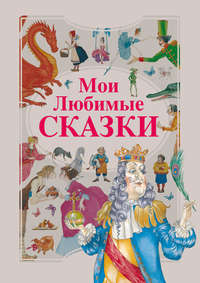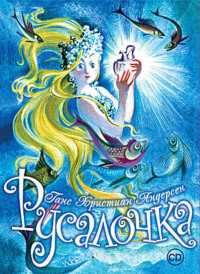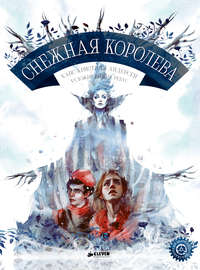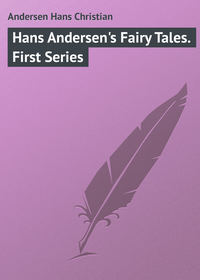 полная версия
полная версияWhat the Moon Saw: and Other Tales
"I see I must attack these things vigorously," he said; and attacked them with vigour accordingly. But while he was looking for the truth, came the Evil One, the father of lies. Gladly would the fiend have plucked out the eyes of this Seer; but that would have been too direct; the devil works in a more cunning way. He let him see and seek the true and the good; but while the young man was contemplating them, the evil spirit blew one mote after another into each of his eyes; and such a proceeding would be hurtful even to the best sight. Then the fiend blew upon the motes, so that they became beams; and the eyes were destroyed, and the Seer stood like a blind man in the wide world, and had no faith in it: he lost his good opinion of it and himself; and when a man gives up the world and himself, all is over with him.
"Over!" said the wild swan, who flew across the sea towards the east. "Over!" twittered the swallows, who likewise flew eastward, towards the Tree of the Sun. That was no good news that they carried to the young man's home.
"I fancy the Seer must have fared badly," said the second brother; "but the Hearer may have better fortune." For this one possessed the sense of hearing in an eminent degree: he could hear the grass grow, so quick was he to hear.
He took a hearty leave of all at home, and rode away, provided with good abilities and good intentions. The swallows escorted him, and he followed the swans; and he stood far from his home in the wide world.
But he experienced the fact that one may have too much of a good thing. His hearing was too fine. He not only heard the grass grow, but could hear every man's heart beat, in sorrow and in joy. The whole world was to him like a great clockmaker's workshop, wherein all the clocks were going "tick, tick!" and all the turret clocks striking "ding dong!" It was unbearable. For a long time his ears held out, but at last all the noise and screaming became too much, for one man. There came blackguard boys of sixty years old – for years alone don't make men – and raised a tumult at which the hearer might certainly have laughed, but for the applause which followed, and which echoed through every house and street, and was audible even in the country high road. Falsehood thrust itself forward, and played the master; the bells on the fool's cap jangled, and declared they were church bells; and the noise became too bad for the Hearer, and he thrust his fingers into his ears; but still he could hear false singing and bad sounds, gossip and idle words, scandal and slander, groaning and moaning without and within. Heaven help us! He thrust his fingers deeper and deeper into his ears, but at last the drums burst. Now he could hear nothing at all of the good, the true, and the beautiful, for his hearing was to have been the bridge by which he crossed. He became silent and suspicious, trusted no one at last, not even himself, and, no longer hoping to find and bring home the costly jewel, he gave it up, and gave himself up; and that was the worst of all. The birds who winged their flight towards the east brought tidings of this, till the news reached the castle in the Tree of the Sun.
"I will try now!" said the third brother. "I have a sharp nose!"
Now that was not said in very good taste; but it was his way, and one must take him as he was. He had a happy temper, and was a poet, a real poet: he could sing many things that he could not say, and many things struck him far earlier than they occurred to others. "I can smell fire!" he said; and he attributed to the sense of smelling, which he possessed in a high degree, a great power in the region of the beautiful. "Every fragrant spot in the realm of the beautiful has its frequenters," he said. "One man feels at home in the atmosphere of the tavern, among the flaring tallow candles, where the smell of spirits mingles with the fumes of bad tobacco. Another prefers sitting among the overpowering scent of jessamine, or scenting himself with strong clove oil. This man seeks out the fresh sea breeze, while that one climbs to the highest mountain top and looks down upon the busy little life beneath." Thus he spake. It seemed to him as if he had already been out in the world, as if he had already associated with men and known them. But this experience arose from within himself: it was the poet within him, the gift of Heaven, and bestowed on him in his cradle.
He bade farewell to his paternal roof in the Tree of the Sun, and departed on foot through the pleasant scenery of home. Arrived at its confines, he mounted on the back of an ostrich, which runs faster than a horse; and afterwards, when he fell in with the wild swans, he swung himself on the strongest of them, for he loved change; and away he flew over the sea to distant lands with great forests, deep lakes, mighty mountains, and proud cities; and wherever he came it seemed as if sunshine travelled with him across the fields, for every flower, every bush, every tree exhaled a new fragrance, in the consciousness that a friend and protector was in the neighbourhood, who understood them and knew their value. The crippled rose bush reared up its twigs, unfolded its leaves, and bore the most beautiful roses; every one could see it, and even the black damp wood-snail noticed its beauty.
"I will give my seal to the flower," said the Snail; "I have spit at it, and I can do no more for it."
"Thus it always fares with the beautiful in this world!" said the poet; and he sang a song concerning it, sang it in his own way; but nobody listened. Then he gave the drummer twopence and a peacock's feather, and set the song for the drum, and had it drummed in all the streets of the town; and the people heard it, and said, "That's a well-constructed song." Then the poet sang several songs of the beautiful, the true, and the good. His songs were listened to in the tavern, where the tallow candles smoked, in the fresh meadow, in the forest, and on the high seas. It appeared as if this brother was to have better fortune than the two others. But the evil spirit was angry at this, and accordingly he set to work with incense powder and incense smoke, which he can prepare so artfully as to confuse an angel, and how much more therefore a poor poet! The Evil One knows how to take that kind of people! He surrounded the poet so completely with incense, that the man lost his head, and forgot his mission and his home, and at last himself – and ended in smoke.
But when the little birds heard of this they mourned, and for three days they sang not one song. The black wood-snail became blacker still, not for grief, but for envy. "They should have strewed incense for me," she said, "for it was I who gave him his idea of the most famous of his songs, the drum song of 'The Way of the World;' it was I who spat at the rose! I can bring witness to the fact."
But no tidings of all this penetrated to the poet's home in India, for all the birds were silent for three days; and when the time of mourning was over, their grief had been so deep that they had forgotten for whom they wept. That's the usual way!
"Now I shall have to go out into the world, to disappear like the rest," said the fourth brother. He had just as good a wit as the third, but he was no poet, though he could be witty. Those two had filled the castle with cheerfulness, and now the last cheerfulness was going away. Sight and hearing has always been looked upon as the two chief senses of men, and as the two that it is most desirable to sharpen; the other senses are looked upon as of less consequence. But that was not the opinion of this son, as he had especially cultivated his taste in every respect, and taste is very powerful. It holds sway over what goes into the mouth, and also over what penetrates into the mind; and consequently this brother tasted everything that was stored up in bottles and pots, saying that this was the rough work of his office. Every man was to him a vessel in which something was seething, every country an enormous kitchen, a kitchen of the mind.
"That was no delicacy," he said, and he wanted to go out and try what was delicate. "Perhaps fortune may be more favourable to me than it was to my brothers," he said. "I shall start on my travels. But what conveyance shall I choose? Are air balloons invented yet?" he asked his father, who knew of all inventions that had been made, or that were to be made. But air balloons had not yet been invented, nor steam ships, nor railways. "Good: then I shall choose an air balloon," he said; "my father knows how they are made and guided. Nobody has invented them yet, and consequently the people will believe that it is an aërial phantom. When I have used the balloon I will burn it, and for this purpose you must give me a few pieces of the invention that will be made next – I mean chemical matches."
And he obtained what he wanted, and flew away. The birds accompanied him farther than they had flown with the other brothers. They were curious to know what would be the result of the flight, and more of them came sweeping up: they thought he was some new bird; and he soon had a goodly following. The air became black with birds, they came on like a cloud – like the cloud of locusts over the land of Egypt.
Now he was out in the wide world.
The balloon descended over one of the greatest cities, and the aëronaut took up his station on the highest point, on the church steeple. The balloon rose again, which it ought not to have done: where it went to is not known, but that was not a matter of consequence, for it was not yet invented. Then he sat on the church steeple. The birds no longer hovered around him, they had got tired of him, and he was tired of them.
All the chimneys in the town were smoking merrily. "Those are altars erected to thy honour!" said the Wind, who wished to say something agreeable to him. He sat boldly up there, and looked down upon the people in the street. There was one stepping along, proud of his purse, another of the key he carried at his girdle, though he had nothing to unlock; one proud of his moth-eaten coat, another of his wasted body. "Vanity! I must hasten downward, dip my finger in the pot, and taste!" he said. "But for awhile I will still sit here, for the wind blows so pleasantly against my back. I'll sit here so long as the wind blows. I'll enjoy a slight rest. 'It is good to sleep long in the morning, when one has much to do,' says the lazy man. I'll stop here so long as this wind blows, for it pleases me."
And there he sat, but he was sitting upon the weathercock of the steeple, which kept turning round and round with him, so that he was under the false impression that the same wind still blew; so he might stay up there a goodly while.
But in India, in the castle in the Tree of the Sun, it was solitary and still, since the brothers had gone away one after the other.
"It goes not well with them," said the father; "they will never bring the gleaming jewel home; it is not made for me; they are gone, they are dead!" And he bent down over the Book of Truth, and gazed at the page on which he should read of life after death; but for him nothing was to be seen or learned upon it.
The blind daughter was his consolation and joy: she attached herself with sincere affection to him; for the sake of his peace and joy she wished the costly jewel might be found and brought home. With kindly longing she thought of her brothers. Where were they? Where did they live? She wished sincerely that she might dream of them, but it was strange, not even in dreams could she approach them. But at length, one night, she dreamt that the voices of her brothers sounded across to her, calling to her from the wide world, and she could not refrain, but went far far out, and yet it seemed in her dream that she was still in her father's house. She did not meet her brothers, but she felt, as it were, a fire burning in her hand, but it did not hurt her, for it was the jewel she was bringing to her father. When she awoke, she thought for a moment that she still held the stone, but it was the knob of her distaff that she was grasping. During the long nights she had spun incessantly, and round the distaff was turned a thread, finer than the finest web of the spider; human eyes were unable to distinguish the separate threads. She had wetted them with her tears, and the twist was strong as a cable. She rose, and her resolution was taken: the dream must be made a reality. It was night, and her father slept. She pressed a kiss on his hand, and then took her distaff, and fastened the end of the thread to her father's house. But for this, blind as she was, she would never have found her way home; to the thread she must hold fast, and trust not to herself or to others. From the Tree of the Sun she broke four leaves; these she would confide to wind and weather, that they might fly to her brothers as a letter and a greeting, in case she did not meet them in the wide world. How would she fare out yonder, she, the poor blind child? But she had the invisible thread to which she could hold fast. She possessed a gift which all the others lacked. This was thoroughness; and in virtue of this it seemed as if she could see to the tips of her fingers, and hear down into her very heart.
And quietly she went forth into the noisy, whirling, wonderful world, and wherever she went the sky grew bright – she felt the warm ray – the rainbow spread itself out from the dark world through the blue air. She heard the song of the birds, and smelt the scent of orange groves and apple orchards so strongly that she seemed to taste it. Soft tones and charming songs reached her ear, but also howling and roaring, and thoughts and opinions, sounded in strange contradiction to each other. Into the innermost depths of her heart penetrated the echoes of human thoughts and feelings. One chorus sounded darkly —
"The life of earth is a shadow vainA night created for sorrow!"but then came another strain —
"The life of earth is the scent of the rose,With its sunshine and its pleasure."And if one strophe sounded painfully —
"Each mortal thinks of himself alone,This truth has been manifested" —on the other side the answer pealed forth —
"A mighty stream of warmest love,All through the world shall guide us."She heard, indeed, the words —
"In the little petty whirl here below,Each thing shows mean and paltry;"but then came also the comfort —
"Many things great and good are achieved,That the ear of man heareth never."and if sometimes the mocking strain sounded around her —
"Join in the common cry: with a jestDestroy the good gifts of the Giver."in the blind girl's heart a stronger voice repeated —
"To trust in thyself and in God is best;His good will be done for ever."And whenever she entered the circle of human kind, and appeared among young or old, the knowledge of the true, the good, and the beautiful beamed into their hearts. Whether she entered the study of the artist, or the festive, decorated hall, or the crowded factory, with its whirring wheels, it seemed as though a sunbeam were stealing in – as if the sweet string sounded, the flower exhaled its perfume, and a living dew-drop fell upon the exhausted blood.
But the evil spirit could not see this and be content. He has more cunning than ten thousand men, and he found out a way to compass his end. He betook himself to the marsh, collected little bubbles of the stagnant water, and passed over them a sevenfold echo of lying words to give them strength. Then he pounded up paid-for heroic poems and lying epitaphs, as many as he could get, boiled them in tears that envy had shed, put upon them rouge he had scraped from faded cheeks, and of these he composed a maiden, with the aspect and gait of the blessed blind girl, the angel of thoroughness; and then the Evil One's plot was in full progress. The world knew not which of the two was the true one; and, indeed, how should the world know?
"To trust in thyself and in God is best;His good will be done for ever,"sung the blind girl, in full faith. She intrusted the four green leaves from the Tree of the Sun to the winds, as a letter and a greeting to her brothers, and had full confidence that they would reach their destination, and that the jewel would be found which outshines all the glories of the world. From the forehead of humanity it would gleam even to the castle of her father.
"Even to my father's house," she repeated. "Yes, the place of the jewel is on earth, and I shall bring more than the promise of it with me. I feel its glow, it swells more and more in my closed hand. Every grain of truth, were it ever so fine, which the sharp wind carried up and whirled towards me, I took up and treasured; I let it be penetrated by the fragrance of the beautiful, of which there is so much in the world, even for the blind. I took the sound of the beating heart engaged in what is good, and added it to the first. All that I bring is but dust, but still it is the dust of the jewel we seek, and in plenty. I have my whole hand full of it." And she stretched forth her hand towards her father. She was soon at home – she had travelled thither in the flight of thoughts, never having quitted her hold of the invisible thread from the paternal home.
The evil powers rushed with hurricane fury over the Tree of the Sun, pressed with a wind-blast against the open doors, and into the sanctuary where lay the Book of Truth.
"It will be blown away by the wind!" said the father, and he seized the hand she had opened.
"No," she replied, with quiet confidence, "it cannot be blown away; I feel the beam warming my very soul."
And the father became aware of a glancing flame, there where the shining dust poured out of her hand over the Book of Truth, that was to tell of the certainty of an everlasting life, and on it stood one shining word – one only word – "Believe."
And with the father and daughter were again the four brothers. When the green leaf fell upon the bosom of each, a longing for home had seized them, and led them back. They had arrived. The birds of passage, and the stag, the antelope, and all the creatures of the forest followed them, for all wished to have a part in their joy.
We have often seen, where a sunbeam bursts through a crack in the door into the dusty room, how a whirling column of dust seems circling round; but this was not poor and insignificant like common dust, for even the rainbow is dead in colour compared with the beauty which showed itself. Thus, from the leaf of the book with the beaming word "Believe," arose every grain of truth, decked with the charms of the beautiful and the good, burning brighter than the mighty pillar of flame that led Moses and the children of Israel through the desert; and from the word "Believe" the bridge of Hope arose, spanning the distance, even to the immeasurable love in the realms of the Infinite.
THE BUTTERFLY
The Butterfly wished for a bride; and, as may be imagined, he wanted to select a very pretty one from among the flowers; therefore he threw a critical glance at all the flower-beds, and found that every flower sat quietly and demurely on her stalk, just as a maiden ought to sit, before she is engaged; but there were a great many of them, and the choice threatened to become wearisome. The Butterfly did not care to take much trouble, and consequently he flew off on a visit to the daisies. The French call this floweret "Marguerite," and they know that Marguerite can prophecy, when lovers pluck off its leaves, and ask of every leaf they pluck some question concerning their lovers. "Heartily? Painfully? Loves me much? A little? Not at all?" and so on. Every one asks in his own language. The Butterfly came to Marguerite too, to inquire; but he did not pluck off her leaves: he kissed each of them, for he considered that most is to be done with kindness.
"Darling Marguerite daisy!" he said to her, "you are the wisest woman among the flowers. Pray, pray tell me, shall I get this one or that? Which will be my bride? When I know that, I will directly fly to her, and propose for her."
But Marguerite did not answer him. She was angry that he had called her a "woman," when she was yet a girl; and there is a great difference. He asked for the second and for the third time, and when she remained dumb, and answered him not a word, he would wait no longer, but flew away to begin his wooing at once.
It was in the beginning of spring; the crocus and the snowdrop were blooming around.
"They are very pretty," thought the Butterfly. "Charming little lasses, but a little too much of the schoolgirl about them." Like all young lads, he looked out for the elder girls.
Then he flew of to the anemones. These were a little too bitter for his taste; the violet somewhat too sentimental; the lime blossoms were too small, and, moreover, they had too many relations; the apple blossoms – they looked like roses, but they bloomed to-day, to fall off to-morrow, to fall beneath the first wind that blew; and he thought that a marriage with them would last too short a time. The pease blossom pleased him best of all: she was white and red, and graceful and delicate, and belonged to the domestic maidens who look well, and at the same time are useful in the kitchen. He was just about to make his offer, when close by the maiden he saw a pod at whose end hung a withered flower.
"Who is that?" he asked.
"That is my sister," replied the Pease Blossom.
"Oh, indeed; and you will get to look like her!" he said. And away he flew, for he felt quite shocked.
The honeysuckle hung forth blooming from the hedge, but there was a number of girls like that, with long faces and sallow complexions. No, he did not like her.
But which one did he like?
The spring went by, and the summer drew towards its close; it was autumn, but he was still undecided.
And now the flowers appeared in their most gorgeous robes, but in vain; they had not the fresh fragrant air of youth. But the heart demands fragrance, even when it is no longer young, and there is very little of that to be found among the dahlias and dry chrysanthemums, therefore the Butterfly turned to the mint on the ground.
You see this plant has no blossom; but indeed it is blossom all over, full of fragrance from head to foot, with flower scent in every leaf.
"I shall take her," said the Butterfly.
And he made an offer for her.
But the mint stood silent and stiff, listening to him. At last she said,
"Friendship, if you please; but nothing more. I am old, and you are old, but we may very well live for one another; but as to marrying – no – don't let us appear ridiculous at our age."
And thus it happened that the Butterfly had no wife at all. He had been too long choosing, and that is a bad plan. So the Butterfly became what we call an old bachelor.
It was late in autumn, with rain and cloudy weather. The wind blew cold over the backs of the old willow trees, so that they creaked again. It was no weather to be flying about in summer clothes, nor, indeed, was the Butterfly in the open air. He had got under shelter by chance, where there was fire in the stove and the heat of summer. He could live well enough, but he said,
"It's not enough merely to live. One must have freedom, sunshine, and a little flower."
And he flew against the window-frame, and was seen and admired, and then stuck upon a pin and placed in the box of curiosities; they could not do more for him.
"Now I am perched on a stalk, like the flowers," said the Butterfly. "It certainly is not very pleasant. It must be something like being married, for one is stuck fast."
And he consoled himself in some measure with the thought.
"That's very poor comfort," said the potted Plants in the room.
"But," thought the Butterfly, "one cannot well trust these potted Plants. They've had too much to do with mankind."
IN THE UTTERMOST PARTS OF THE SEA
Great ships had been sent up towards the North Pole, to explore the most distant coasts, and to try how far men might penetrate up yonder. For more than a year they had already been pushing their way among ice, and snow, and mist, and their crews had endured many hardships; and now the winter was come, and the sun had entirely disappeared from those regions. For many many weeks there would now be a long night. All around, as far as the eye could reach, was a single field of ice; the ships had been made fast to it, and the snow had piled itself up in great masses, and of these huts had been built in the form of beehives, some of them spacious as the old "Hun's Graves" – others only containing room enough to hold two or four men. But it was not dark, for the northern lights flamed red and blue, like a great continual firework; and the snow glistened and gleamed, so that the night here was one long, flaming, twilight hour. When the gleam was brightest, the natives came in crowds, wonderful to behold in their rough, hairy, fur dresses; and they rode in sledges formed of blocks of ice, and brought with them furs and peltry in great bundles, so that the snow houses were furnished with warm carpets; and, in turn, the furs also served for coverlets when the sailors went to bed under their roofs of snow, while outside it froze in far different fashion than here with us in the winter. In our regions it was still the late autumn-time; and they thought of that up yonder, and often pictured to themselves the yellow leaves on the trees of home. The clock showed that it was evening, and time to go to sleep; and in the huts two men already had stretched themselves out, seeking rest. The younger of these had his best, dearest treasure, that he had brought from home – the Bible, which his grandmother had given him on his departure. Every night the sacred volume rested beneath his head, and he knew from his childish years what was written in it. Every day he read in the book, and often the holy words came into his mind where it is written, "If I take the wings of the morning, and flee into the uttermost parts of the sea, even there Thou art with me, and Thy right hand shall uphold me;" and, under the influence of the eternal word and of the true faith, he closed his eyes, and sleep came upon him, and dreams – the manifestation of Providence to the spirit. The soul lived and was working while the body was enjoying its rest: he felt this life, and it seemed to him as if dear old well-known melodies were sounding; as if the mild breezes of summer were playing around him; and over his bed he beheld a brightness, as if something were shining in through the crust of snow. He lifted up his head, and behold, the bright gleam was no ripple down from the snowy roof, but came from the mighty pinions of an angel, into whose beaming face he was gazing. As if from the cup of a lily the angel arose from among the leaves of the Bible, and stretching out his arm, the walls of the snow hut sunk down around, as though they had been a light airy veil of mist; the green meadows and hills of home, and its ruddy woods, lay spread around him in the quiet sunshine of a beauteous autumn day; the nest of the stork was empty, but ripe fruit still clung to the wild apple tree, although the leaves, had fallen; the red hips gleamed, and the magpie whistled in the green cage over the window of the peasant's cottage that was his home; the magpie whistled the tune that had been taught him, and the grandmother hung green food around the cage, as he, the grandson, had been accustomed to do; and the daughter of the blacksmith, very young and fair, stood by the well drawing water, and nodded to the granddame, and the old woman nodded to her, and showed her a letter that had come from a long way off. That very morning the letter had arrived from the cold regions of the North – there where the grandson was resting in the hand of God. And they smiled and they wept; and he, far away among the ice and snow, under the pinions of the angel, he, too, smiled and wept with them in spirit, for he saw them and heard them. And from the letter they read aloud the words of Holy Writ, that in the uttermost parts of the sea HIS right hand would be a stay and a safety. And the sound of a beauteous hymn welled up all around; and the angel spread his wings like a veil over the sleeping youth. The vision had fled, and it grew dark in the snow hut; but the Bible rested beneath his head, and faith and hope dwelt in his soul. God was with him; and he carried home about with him in his heart, even in the uttermost parts of the sea.









